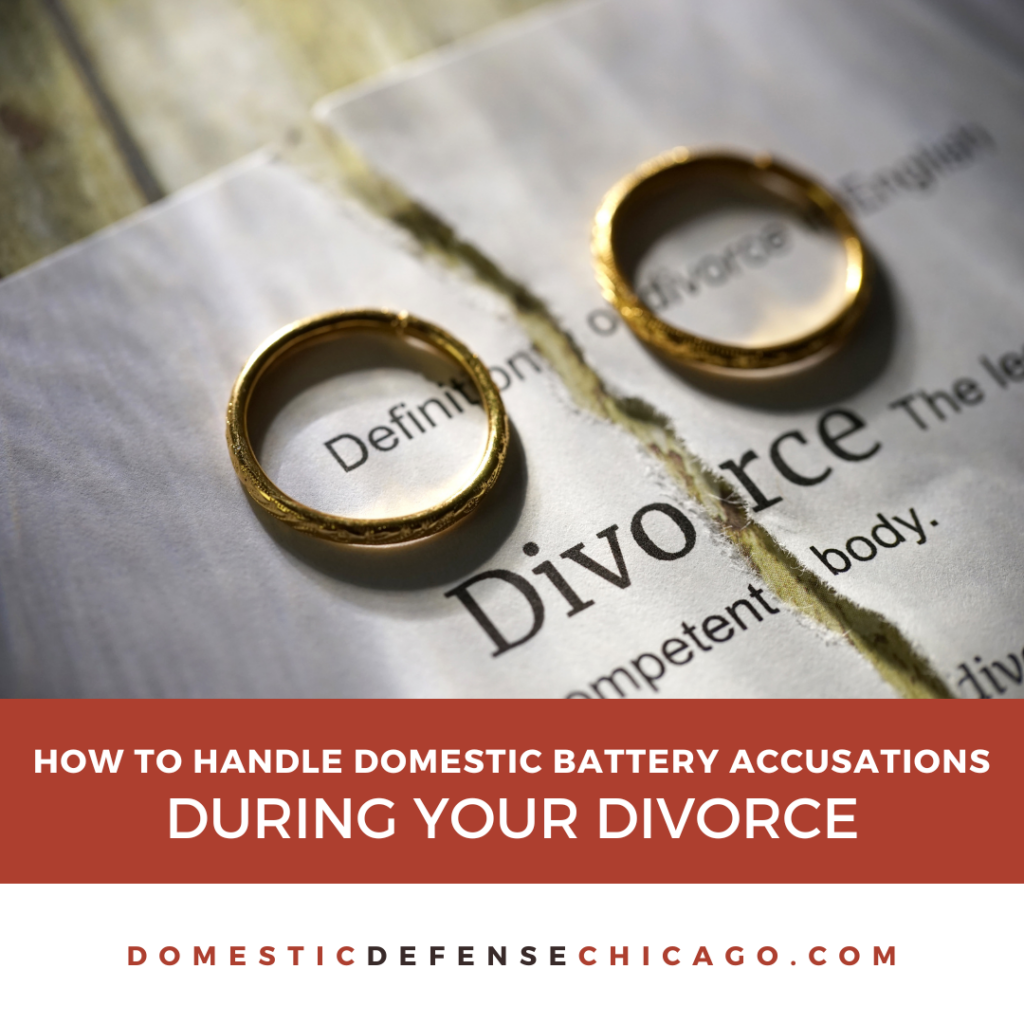Facing domestic battery allegations during divorce proceedings can complicate an already difficult situation. It’s important to understand your rights and the legal steps you should take to defend yourself against these charges.
How to Handle Domestic Battery Allegations During Divorce Proceedings
From a criminal law perspective, handling domestic battery allegations during divorce proceedings involves understanding the charges, protecting your rights, and building a strong defense. This guide explains the following:
- Understanding domestic battery charges
- Hiring a criminal defense lawyer
- Protecting your rights during the investigation
- Gathering evidence and witnesses
- Preparing for court hearings
Here’s a closer look at each.
Understanding Domestic Battery Charges
Domestic battery in Illinois involves causing bodily harm or making physical contact of an insulting or provoking nature with a family or household member. These charges can have severe consequences, including jail time, fines, probation, and a criminal record. It’s essential to understand the specifics of the charges against you and the potential penalties. Your lawyer will explain the charges and help you navigate the legal process.
Related: Domestic battery defense information
Hiring a Criminal Defense Lawyer
Hiring a skilled criminal defense lawyer is crucial when facing domestic battery allegations. Your lawyer will provide legal advice, represent you in court, and help you build a strong defense. They will investigate the allegations, gather evidence, and challenge the prosecution’s case. Having a lawyer on your side can significantly improve your chances of a favorable outcome. Contact a lawyer as soon as possible after the allegations are made.
Protecting Your Rights During the Investigation
Protecting your rights during the investigation is vital. You have the right to remain silent and not answer any questions from the police or other authorities without your lawyer present. Anything you say can be used against you in court, so it’s important to exercise this right. Inform the police that you wish to remain silent and that you want to speak with a lawyer. Follow your lawyer’s advice throughout the investigation.
Gathering Evidence and Witnesses
Gathering evidence and witnesses is crucial to building a strong defense. Your lawyer will help you collect relevant evidence, such as photos, videos, medical records, and communication records. They will also identify and interview potential witnesses who can support your version of events. Presenting strong evidence and credible witnesses can help challenge the allegations and establish your innocence.
Related: What to do if someone gets an order of protection against you
Preparing for Court Hearings
Preparing for court hearings involves working closely with your lawyer to develop a defense strategy. Your lawyer will guide you through the legal process, help you understand what to expect, and represent you in court. They will present evidence, cross-examine witnesses, and argue on your behalf. Being well-prepared for court hearings can make a significant difference in the outcome of your case.
FAQ About Handling Domestic Battery Allegations During Divorce Proceedings
Check out these commonly asked questions about handling domestic battery allegations during divorce proceedings from a criminal law perspective. If you don’t see your question here, please call our office and we’ll find you the answers you need.
How Should I Respond to Domestic Battery Allegations During Divorce?
You should respond by hiring a criminal defense lawyer immediately. Do not speak to the police or the accuser without your lawyer present. Gather evidence and follow your lawyer’s advice.
Can Domestic Battery Allegations Affect My Divorce Case?
Yes, domestic battery allegations can impact your divorce case, including child custody and property division. However, this guide focuses on handling the criminal law aspects of the allegations.
Related: ILDVA
What Evidence Can Help Defend Against Domestic Battery Charges?
Evidence that can help includes photos, videos, medical records, communication records, and witness statements. Your lawyer will help you gather and present this evidence in court.
How Can a Lawyer Help With Domestic Battery Allegations?
A lawyer can help by providing legal advice, representing you in court, gathering evidence, and building a strong defense. They will work to protect your rights and achieve the best possible outcome for your case.
Related: What are the differences between aggravated domestic battery and domestic battery?
What Are the Potential Penalties for Domestic Battery in Illinois?
Penalties for domestic battery in Illinois can include jail time, fines, probation, and a criminal record. The severity of the penalties depends on the specifics of the case and any prior convictions.
Do You Need to Talk to an Attorney About Domestic Battery Defense?
If you need to talk to a domestic battery defense attorney in Illinois, we’re here to help. Call us at 847-920-4540 now – we’ll be happy to give you a free consultation and talk to you about your options.







Leave A Comment
You must be logged in to post a comment.